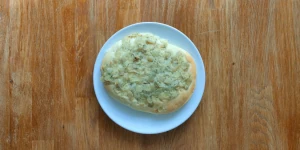
Cebularz - a cake with onion and poppy seeds
Jump to recipe
What is a Cebularz?
A round cake made of wheat dough, baked until golden brown and topped with an aromatic mixture of fried onion and poppy seeds. Although its composition is simple, the taste can surprise even the most demanding gourmets - slightly sweet, onion-buttery, soft in the middle, crispy on the edges.
Traditionally served as a snack or an addition to soups and salads, a Cebularz tastes great both hot and cold. Its simple form and intense aroma make it an irreplaceable element of the regional cuisine of eastern Poland.
The history of a Cebularz - where does this delicacy come from?
A Cebularz has its roots in Jewish cuisine, which co-created the taste map of Lublin before World War II. Jewish bakers baked Cebularz and sold them at markets and in the streets - wrapped in paper, crispy, smelling of onion.
Cebularz is directly descended from a Jewish pastry called pletzel (or pletzlach), which was popular among Ashkenazi communities in Eastern Europe, including Poland, Lithuania, and Ukraine.
After the war, the tradition of baking was taken over by local bakers, and the onion roll became a regional product. In 2007, it was entered on the List of Traditional Products of the Ministry of Agriculture, and since 2014, it has been marked with the EU Protected Geographical Indication (PGI). This means that only a product from the Lublin region, made according to a traditional recipe, can be called a real onion roll.
Interestingly, similar baked goods existed (and still do!) in other regions of Poland - although under different names and in a slightly modified form.
In Mazovia, people have been baking so-called "cebulaki" for generations - rectangular yeast pancakes with fried onion, sometimes with the addition of potatoes or bacon. Rustic, filling and baked in large baking trays - they are a kind of "homemade cousin" of "cebularz".
In turn, in Podkarpacie, you can find "kołacze z cebulą" - fluffy pancakes made of yeast dough, with onion or onion and egg filling. Often baked for holidays, they have a slightly softer, almost bun-like structure, but their taste is very similar to "cebularz".
All this shows that "cebularz" - although today most strongly associated with Lublin - is part of a larger, shared history of Polish baked goods with onion. From pletzel baked in Jewish ovens to Mazovian cepak from home cooking - this taste is a true culinary heritage worth cultivating.
Cebularz today - where to find it?
Of course, you can find the best onion rolls in Lublin - in bakeries, at fairs and during local festivals. There is even an Onion Roll Festival here, and the city centre has a Museum of Onion Rolls, where you can learn about its history and learn how to bake it.
But onion rolls have also spread further - they appear in bakeries in Warsaw, Krakow, Poznań, and abroad: in the Polish districts of New York, Chicago and London. Often served as an "onion roll", but proudly signed as "cebularz lubelski".
Recipe informations:
Ingredients for the onion insert
- 2 medium onions
- 3 tablespoons oil
- 2 tablespoons poppy seeds (not ground)
Ingredients for dought
- 250g wheat flour
- 8g yeast
- half a glass of water or water mixed with milk (half and half)
- a flat teaspoon of salt
- a flat teaspoon of sugar
- 2 tablespoons of soft butter
